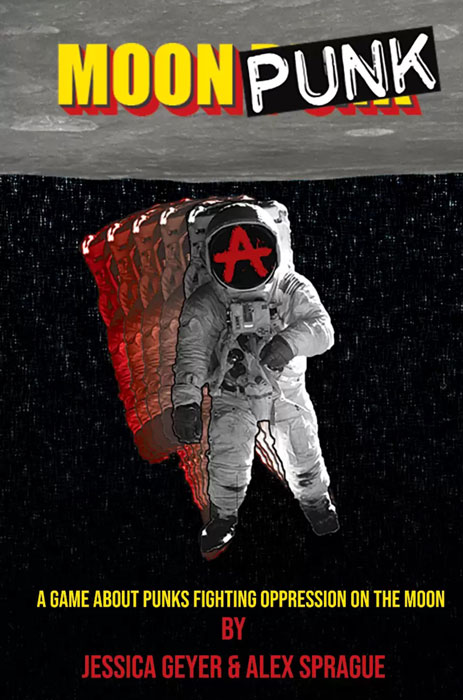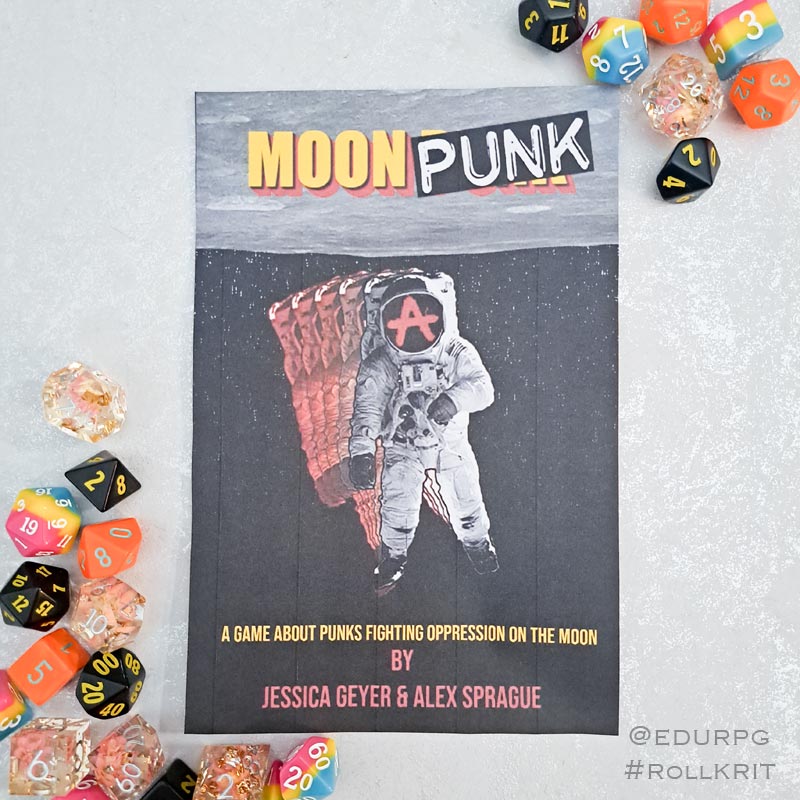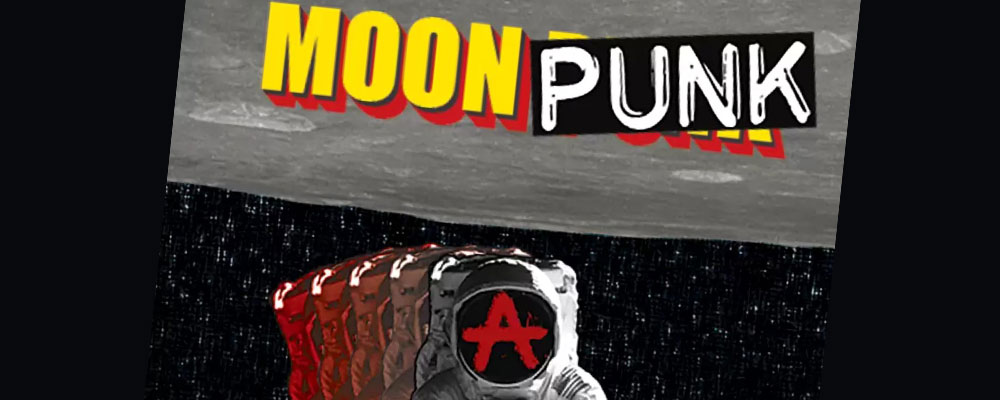Dieser Blogbeitrag ist Teil der Reihe #RollKRIT (Rollenspiele zum Kampf gegen Rechtsextremismus durch Förderung von Inklusion und Toleranz). english below
Teil 8 – Moon Punk
Das TTRPG Moon Punk wurde 2020 von Jessica Geyer und Alex Sprague bei Wannabe Games entwickelt, einem kleinen und unabhängigen Rollenspielstudio. Die beiden Autoren sind für ihre innovativen und oft politischen Rollenspielkonzepte bekannt. Dabei werden ihre Arbeiten meist stark von progressiven Ideen geprägt und sie integrieren bewusst marginalisierte Perspektiven in ihre Spiele. In Moon Punk setzen sie dabei insbesondere den Geist des Punk ästhetisch, aber auch inhaltlich und spielmechanisch um.
Förderung einer inklusiven Gemeinschaft
Spielende sollen durch dieses TTRPG dazu ermutigt werden, sich gegen Unterdrückung und Korruption einzusetzen und dabei die positive Bedeutung von inklusiver Gemeinschaft hervorzuheben. Dabei greifen die Autoren auf Science-Fiction-Elemente zurück, um eine dystopische Zukunftswelt zu entwerfen, die reale gesellschaftliche Strukturen spiegelt. Der Mond dient als metaphorische Spielwiese für Rebellion und Emanzipation – die Handlung könnte jedoch ebenso auf unserer Erde angesiedelt sein.
Spielende übernehmen in Moon Punk die Rollen von Menschen, die außerhalb einer stark autoritären Gesellschaft stehen und sich gegen eine unterdrückerische Macht zur Wehr setzen. Im Gegensatz zu einigen anderen Spielen, die in der #RollKRIT Reihe vorgestellt werden, geht es in Moon Punk allerdings nicht primär um physische Konfrontationen und das Erleben der Auswirkungen von Extremismus, sondern ebenso wichtig ist die Entwicklung sinnvoller sozialer Strategien gegen autoritäre Strukturen: Proteste und gemeinschaftlicher Zusammenhalt spielen in Moon Punk eine ebenso große Rolle wie klassische Action-Szenen.
PbtA-Spielmechanik
Die Mechaniken des Spiels legen ihren Schwerpunkt vor allem auf narrative Gestaltungsmöglichkeiten und kollektives Geschichtenerzählen. Das System basiert auf dem Powered by the Apocalypse-Regelwerk (PbtA), das durch flexible Spielmechaniken gekennzeichnet ist. Entscheidungen werden durch das Zusammenspiel von Spielleitung und Mitspielenden bestimmt.
Ein besonders relevantes Element ist in diesem Fall die Betonung von emotionalen und sozialen Konflikten, während ein weiterer wichtiger Fokus auf die Einbindung von Gemeinschaftsressourcen gelegt wird. Das Spiel setzt darauf, dass Widerstand nicht von Einzelnen, sondern von Gruppen getragen wird. So müssen die Spielenden beispielsweise gemeinsam Strategien entwickeln, um sich gegen staatliche Repression zu wehren, Ressourcen sinnvoll zu nutzen und Allianzen zu schmieden.
Eine dystopische, aber vertraute Welt
Indem Moon Punk die Spielenden in eine dystopische, aber vertraute Welt eintauchen lässt, können sie durch die Augen ihrer SC Mechanismen der Unterdrückung erfahren, sowie Fragen nach Gerechtigkeit und Verantwortung aufwerfen. Alternative Perspektiven gegen soziale Ungleichheit und Ausgrenzung lassen sich ebenso erproben, wie Wege des Protests und die Initiierung von gesellschaftlichem Wandel.
Das Spiel zeigt dabei, dass Widerstand nicht in Gewalt münden muss, sondern durch Solidaritat, kreative Aktionsformen und Kooperation erfolgreich sein kann. Moon Punk kann in diesem Sinne durchaus in Bildungskontexten genutzt werden, um demokratische Werte zu thematisieren. Letztlich sind die Förderung von Empathie und Perspektivwechsel ja wichtige Aspekte, um extremistischen Ideologien entgegenzuwirken.
Oder um es in den Worten der Autoren des Spiels auszudrücken:
MoonPunk ermächtigt Spielende, so punkig zu sein, wie sie wollen, und sich gegen die korrupten Systeme zu wehren, die sie in der Welt sehen – sowohl im Spiel als auch außerhalb. In dieser retrofuturistischen, dystopischen Version des Mondes liegt es an allen, zu protestieren, Widerstand zu leisten und die Autorität zu bekämpfen, um eine bessere Zukunft aufzubauen.
Also näht euch ein paar Patches auf, stylt eure Haare auf,
und dreht die Lautstärke auf 11.
Die Show geht gleich los.
Erhältlichkeit
Das TTRPGs ist vor allem über itch.io und DriveThruRPG erhältlich. Bei letzterem sogar als PoD-Fassung.
Für wenige Tage ist es außerdem noch in der Bundle of Holding Sammlung Punch Nazis! Erhältlich – u.a. gemeinsam mit den bereits in #RollKRIT besprochenen Spielen Grey Ranks und Eat the Reich.

This Blog Post is Part of the #RollKRIT Series („Roll Dice to Knockdown Radicalism with Inklusion & Tolerance“).
Part 8 – Moon Punk
The TTRPG Moon Punk was developed in 2020 by Jessica Geyer and Alex Sprague at Wannabe Games, a small and independent role-playing game studio. The two authors are known for their innovative and often political RPG concepts. Their works are strongly influenced by progressive ideas, and they consciously integrate marginalized perspectives into their games. In Moon Punk, they translate the spirit of punk not only aesthetically but also in terms of content and game mechanics.
Promoting an Inclusive Community
This TTRPG encourages players to stand up against oppression and corruption while highlighting the positive impact of inclusive communities. The authors use science fiction elements to create a dystopian future world that reflects real societal structures. The Moon serves as a metaphorical playground for rebellion and emancipation – though the story could just as well be set on Earth.
In Moon Punk, players take on the roles of people who exist outside a highly authoritarian society and resist an oppressive power. Unlike some other games featured in the #RollKRIT series, Moon Punk is not primarily about physical confrontations or experiencing the effects of extremism. Instead, it emphasizes the development of meaningful social strategies against authoritarian structures: protests and communal solidarity play just as significant a role as classic action scenes.
PbtA Game Mechanics
The game mechanics focus primarily on narrative possibilities and collective storytelling. The system is based on the Powered by the Apocalypse (PbtA) rule set, which is characterized by flexible gameplay mechanics. Decisions are determined through the interaction between the game master and players.
A particularly relevant element in this context is the emphasis on emotional and social conflicts, while another key aspect is the inclusion of community resources. The game is designed around the idea that resistance is not carried out by individuals alone but by groups. Players must develop strategies together to resist state repression, use resources wisely, and forge alliances.
A Dystopian Yet Familiar World
By immersing players in a dystopian yet familiar world, Moon Punk allows them to experience mechanisms of oppression through the eyes of their characters and raises questions about justice and responsibility. It provides an opportunity to explore alternative perspectives on social inequality and exclusion, as well as different forms of protest and methods for initiating societal change.
The game demonstrates that resistance does not have to lead to violence but can be successful through solidarity, creative activism, and cooperation. In this sense, Moon Punk can even be used in educational contexts to address democratic values. Ultimately, fostering empathy and perspective shifts are crucial aspects of counteracting extremist ideologies.
Or, in the words of the game’s creators:
Moon Punk empowers players to be as punk as they want and to fight back against the systems of corruption they see in the world, both in and out of game. In this retro-futuristic, dystopian version of the Moon, it’s up to everyone to protest, resist, and challenge authority to build a better future. So sew on some patches, spike up your hair, and turn the volume up to 11. The show is about to start.
Availability
The TTRPG is mainly available through itch.io and DriveThruRPG, with the latter even offering a PoD (Print on Demand) version.
For a few more days, it is also available in the Bundle of Holding collection Punch Nazis!, alongside previously discussed #RollKRIT games such as Grey Ranks and Eat the Reich.

